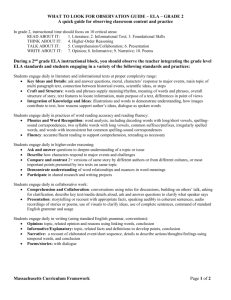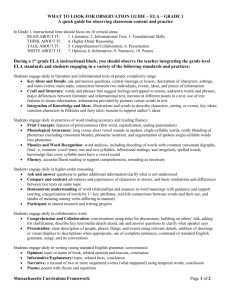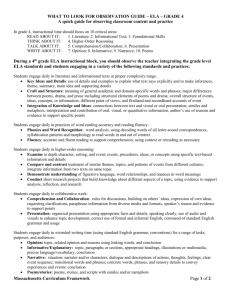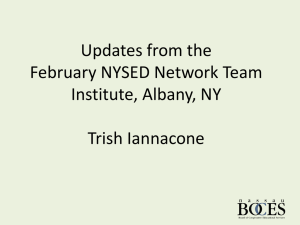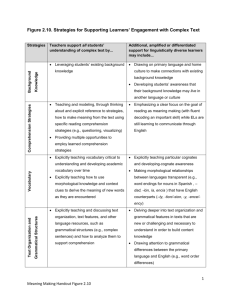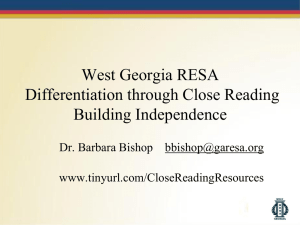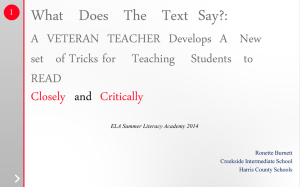ppt, 3.0mb
advertisement
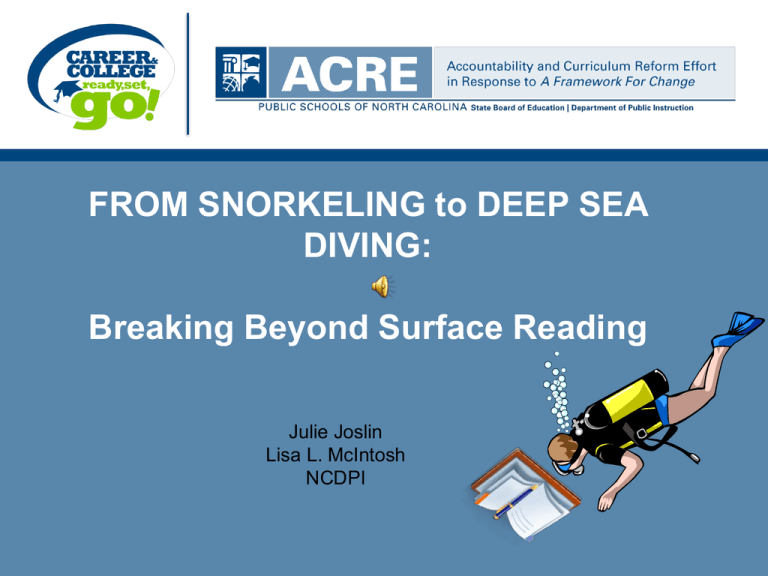
FROM SNORKELING to DEEP SEA DIVING: Breaking Beyond Surface Reading Julie Joslin Lisa L. McIntosh NCDPI The Common Core State Standards: Are aligned with college and work expectations Are focused and coherent Include rigorous content and application of knowledge through high-order skills Build upon strengths and lessons of current state standards Are internationally benchmarked so that all students are prepared to succeed in our global economy and society Are based on evidence and research Are state led – coordinated by NGA Center and CCSSO 4/13/2015 • page 2 NEW, BETTER, DIFFERENT Fewer, Clearer, Higher Rooted in the criteria of “fewer, clearer, higher,” the Common Core State Standards (CCSS, 2010) reflect a strong belief that fewer core standards allow a deeper focus on essential knowledge and skills, that clearer standards can be implemented with rigor and instructional creativity, and that higher standards help all students to learn deeper content knowledge and acquire meaningful authentic skills needed to achieve in a 21st century global society. 4/13/2015 • page 3 College and Career Anchor Standards for Reading K-12 Range of Reading and Text Complexity R.10 Read and comprehend complex literary and informational texts independently and proficiently. 4/13/2015 • page 4 Reading on the “Surface Level” Activity “How to Bartle Puzballs” and “Conversation Piece” What is the difference between how you read the first piece vs. how you read the second piece? 4/13/2015 • page 5 ELA CC State Standards: • bring a sharpened focus to the close connection between comprehension of text and acquisition of knowledge (Text-centered activities and questions, and finding text-based evidence are emphasized) • teaching is not a substitute for the text 4/13/2015 • page 6 Focus on Text Complexity ELA CC State Standards: • focus on short texts worthy of rereading which places a high priority on the close, sustained reading of complex text. • are emphatic about students reading text of an adequate range and complexity. • focus intently on students reading closely to draw evidence from the text itself. • require students to read increasingly complex texts with increasing independence as they progress towards career and college readiness. 4/13/2015 • page 7 “Read like a detective, write like an investigative reporter.” -David Coleman – co-author of ELA CCSS 4/13/2015 • page 8 4/13/2015 • page 9 “Teachers can enhance students’ pleasure and success in reading by showing them how to slow down and savor what they read.” -T. Newkirk 4/13/2015 • page 10 CLOSE READING ACTIVITY • Read the passage. • What strategies do you use when you read a challenging text? 4/13/2015 • page 11 NOTHING can possibly be conceived in the world, or even out of it, which can be called good without qualification, except a Good Will. Intelligence wit, judgment, and the other talents of the mind, however they may be named, or courage, resolution, perseverance, as qualities of temperament, are undoubtedly good and desirable in many respects; but these gifts of nature may also become extremely bad and mischievous if the will which is to make use of them, and which, therefore, constitutes what is called character, is not good. It is the same with the gifts of fortune. Power, riches, honour, even health, and the general well-being and contentment with one’s condition which is called happiness, inspire pride, and often presumption, if there is not a good will to correct the influence of these on the mind, and with this also to rectify the whole principle of acting, and adapt it to its end. The sight of a being who is not adorned with a single feature of a pure and good will, enjoying unbroken prosperity, can never give pleasure to an impartial rational spectator. Thus a good will appears to constitute the indispensable condition even of being worthy of happiness. 4/13/2015 • page 12 Close Reading A short Prezi about how to read closely…. Resource: Deeper Reading: Comprehending Challenging Texts, 4-12 by: Kelly Gallagher 4/13/2015 • page 14 Read the passage silently. There are known knowns. There are things we know that we know. There are known unknowns. That is to say, there are things that we know we don’t know. But there are also unknown unknowns. There are things we don’t know we don’t know. Donald Rumsfeld, Newsweek (2003, p. 113) 4/13/2015 • page 15 Effective First Readings Have you ever arrived at a destination and had no memory of how you got there? Sometimes a first reading can resemble this phenomena! What did I just read? Consider four key questions: 4/13/2015 • page 16 Question 1: Have I provided my students with a reading focus? Question 2: Are my students willing and able to embrace confusion? Question 3: Can my students monitor their own comprehension? Question 4: Do my students know any “fix-it” strategies to assist them when their comprehension begins to falter? 4/13/2015 • page 17 DIVING DEEPER Students come to us with an “I read it and I’m done” mentality. Show them the value of a second reading. Humpty Dumpty sat on a wall, Humpty Dumpty had a great fall. All the King’s horses and all the King’s men, Couldn’t put Humpty together again. Is this about an egg? 4/13/2015 • page 18 Three key questions to ask students after they have read something: They encompass three different levels of thinking. (Sheridan Blau) 1. What does it say? (Literal level – comprehension) (Foundational to answering the second question) 2. What does it mean? (Interpretation level) (More than just appreciating a good story – themes) 3. What does it matter? (Reflection) (The heart of why they read the book) 4/13/2015 • page 19 Student activities to help deepen understanding and move them beyond surface reading 1. Say/Mean Chart What it says What it means 4/13/2015 • page 20 2. Mystery Envelope What is the single most important word in this chapter? Which character has changed the most so far? Why did we read this book? Which character is most (least believable) and why? 4/13/2015 • page 21 3. Use metaphor to deepen comprehension. Using metaphors requires interpretation – making students go to a deeper level and helping students create new meanings. a) Metaphor Poetry Think of a something that has parts. Metaphorically connect those parts to family members. My family is the ocean. My father is the ocean floor, deep and quiet, supporting us all. My mother is…… My brother is…… My sister is…. I am…… b) Book: Shadow by Suzy Lee 4/13/2015 • page 22 Mining the Levels of Reflection “What does it matter?” Humankind Country Community Peers Family Self 4/13/2015 • page 23 How? • Model it • Find strong passages for practice • Annotate: “reading graffiti”- mark word choices, sentence patterns, images and dialogue • Use poetry • Savor passages (Great beginnings and Lyrical pieces) 4/13/2015 • page 24 Remember: The ELA Common Core State Standards • focus on short texts worthy of rereading which places a high priority on the close, sustained reading of complex text. • require students to read increasingly complex texts with increasing independence as they progress towards career and college readiness • are emphatic about students reading text of an adequate range and complexity 4/13/2015 • page 25 Scaffolding… helps students access complex texts directly. allows the reader a first encounter with minimal clarifications. guides the reader with follow-up support. encourages re-reading. Scaffolding doesn’t… •reduce complexity. •replace the text. •tell students what they are going to learn. Often, textbook writers have frontloaded all necessary information to spoil any chance for intellectual discovery on the part of the student. The CCSS wants students to have opportunities to grapple with difficult text. David Coleman 4/13/2015 • page 27 “Deep reading," or slow reading, is a sophisticated process in which people can critically think, reflect and understand the words they are looking at. With most, that means slowing down — even stopping and rereading a page or paragraph if it doesn't sink in — to really capture what the author is trying to say. Experts warn that without reading and really understanding what's being said, it is impossible to be an educated citizen of the world, a knowledgeable voter or even an imaginative thinker. -Laura Casey 4/13/2015 • page 28 Contact Information Julie Joslin, Ed.D. Section Lead Grades 9-12 English Language Arts Consultant 919-807-3935 jjoslin@dpi.state.nc.us Lisa Llewellyn McIntosh K-5 English Language Arts Consultant 919-807-3895 lllewellyn@dpi.state.nc.us 4/13/2015 • page 29
